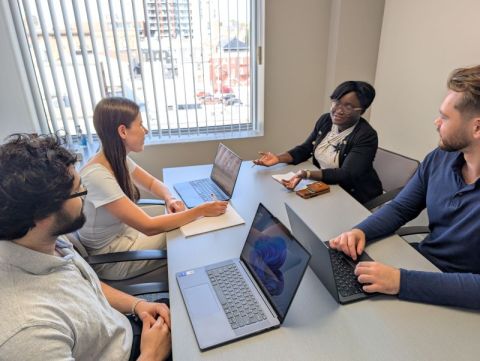

At the Queen’s Business Law Clinic (QBLC), students turn classroom learning into practice – and community members receive vital help with their businesses and not-for-profit organizations. Since its founding in 2009, the clinic has provided free legal services to those who might otherwise struggle to afford counsel.
Alumni reflect on real-world impact
In her third year at Queen’s Law, aspiring corporate commercial lawyer Erin Smith, Law’12 (MBA’11), decided to try the new clinic option recommended by a friend.
“I thought it might be a good opportunity to get some practical experience,” says Smith, now CEO of Grasslands Finance, a Canadian private lender. “That turned out to be a really wise decision. It helped us students realize that – despite the grand theories and monumental cases we studied – what our clients needed most was practical advice about how to move their business goals forward!”
Like Smith, Allan McGavin, Law’12 (Com’08), found that the QBLC offered a vital bridge between theory and practice. As a caseworker in second year, he had “the first practical application of what we were learning: having actual clients. We might help them set up a corporation, establish bylaws, register a business name and trademark, and so on.” In third year, he became clinic manager, overseeing files and handling administrative duties.
McGavin traces his path to law school partly to an undergraduate business law course with the clinic’s founding director, Professor Peter Kissick, Law’88. After graduating from Queen’s Law, McGavin articled at Fasken in Vancouver, practised business law at Farris LLP, and is now Chief Legal Officer at Corix. “The clinic helped lay the foundation for developing the skills to manage client expectations, communicate sometimes esoteric concepts in plain language, and convey that you have their best interests at heart,” he says. “It enabled me to hit the ground running when I got into practice.”
Smith echoes that sentiment: “Being part of the QBLC forced us to get out of the ‘law school theoretical zone’ and into ‘How do I get my client from A to B?’ Many of our clients were non-profits, people trying to do good in the community, but sometimes they came up against legal or administrative barriers. They really wanted our advice!”
After graduating with her combined JD/MBA, Smith clerked at the Saskatchewan Court of Appeal and the Supreme Court of Canada, practised at MLT Aikins in Saskatoon, then transitioned into business leadership. “Having been both a lawyer advising businesses and now a business client, I really appreciate lawyers who realize clients are trying to accomplish a specific objective. QBLC helps students grasp that concept and carry it into their own practices. It provides a great bridging step between law school and real life.”
Building skills for today’s profession
For recent graduate Kira Petriello, Law’25 (Com’21), the QBLC was “the cornerstone of my legal education at Queen’s. It remains one of the most influential experiences in shaping my career path.”
Petriello, now articling at Blake, Cassels & Graydon LLP in Toronto, became a caseworker in second year before serving as a group leader mentoring new caseworkers in third year. She recalls managing four or five files from intake. “We provided advice, conducted research, and produced a final deliverable for each client,” she explains.
The skills she developed – from client communication to balancing multiple files, docketing, and note-taking – translate directly to her articling work. She also values the clinic’s specialized training. “Law schools often emphasize litigation, but rarely do students get training in transactional skills like drafting contracts or advising on corporate structure. The clinic gave me that experience.”
Petriello also credits director Tomi Adebiyi for her mentorship: “She helped me further build habits of professionalism and client service that will stay with me throughout my career.”
Meeting high demand, shaping future growth
With more than 100 applications each year for 24 academic-year caseworker positions and three summer roles, “only one of four Queen’s Law students who applies has the opportunity to participate at the QBLC,” notes Adebiyi. Caseworkers complete a two-semester credit course under the supervision of the director and volunteer review counsel, while summer students ensure continuity of client service.
To keep each student’s workload manageable, the clinic caps its caseload at 120 per year – leaving many applicants on a waitlist, and Kingston start-ups sometimes waiting up to a month for intake assessment meetings.
“For many clients, the QBLC has been a lifeline when starting their businesses, not-for-profits, and charities,” Adebiyi adds. “Having access to free legal services at such a critical time has helped them navigate the intricacies of set-up and avoid costly mistakes. Many clients have expressed appreciation for the professionalism of our student caseworkers, often sending us glowing feedback about their experience.”
Looking ahead, she envisions walk-in clinics for Kingston-area entrepreneurs, where law students under supervision could triage client needs and connect them with QBLC services. “To achieve this vision, however, expanded class sizes and staffing are required.”
As the only Queen’s Law clinic supported entirely through the Faculty’s operating budget, the QBLC reflects the school’s deep commitment to experiential learning. But growing student demand and increasing client needs mean additional funding is essential to sustain and expand its impact. Since 2009, more than 1,900 clients have been served, contributing to economic growth and social well-being in Kingston and beyond.
McGavin, reflecting on his own experience, stresses the importance of alumni support: “Clinical experience is just as valuable as academic in preparing students for the real world. These programs aren’t part of the school’s base funding – and being pro bono, they don’t generate income. They need participation and funding, and I strongly encourage both.”
Support the future of business law
Help expand opportunities for students and services for clients by giving or volunteering.
To support the clinic, gifts can be made to the Queen’s Business Law Clinic Fund.
Alumni can also give back by volunteering as review counsel, as corporate law leader Bob Milnes, Law’69, did after retiring from Gowlings. Read about his contribution as a valued mentor. Lawyers interested in volunteering are invited to contact QBLC Director Tomi Adebiyi at 613-533-2102.
By Nancy Dorrance